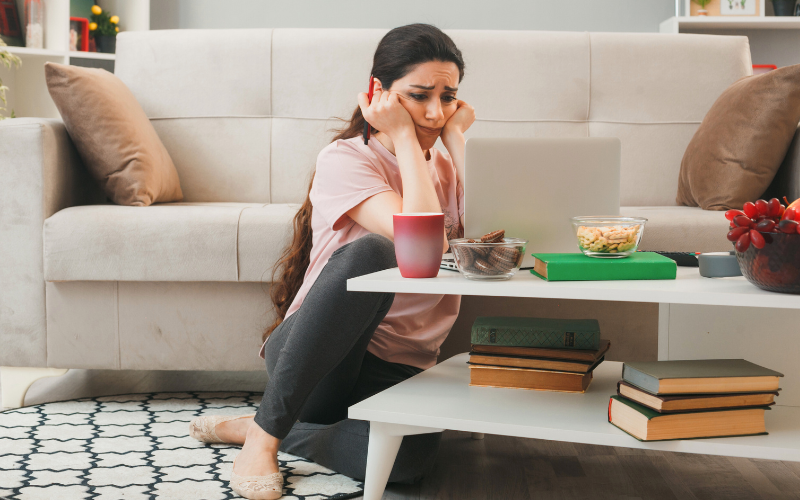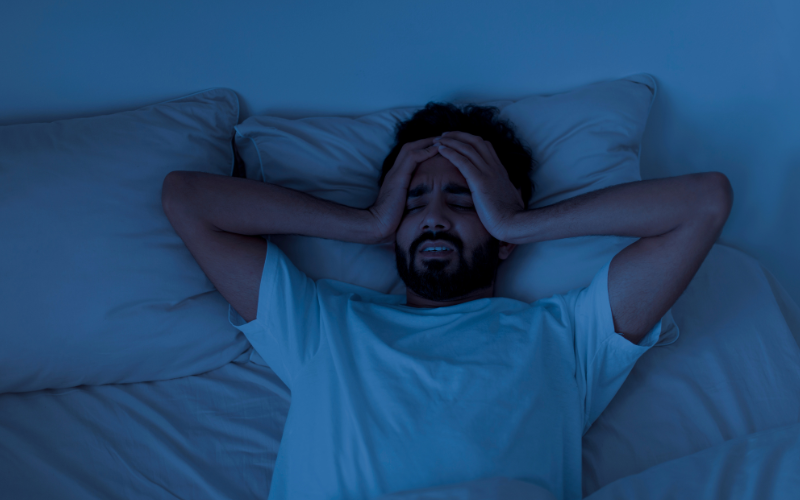Stress vs Anxiety: 5 Alarming Signs You’re Missing!

REVIEWED BY DR. Ankit amar Gupta (Neurosurgeon) on 15 july 2025.
You forgot the grocery list. Your boss texted late at night. Your phone buzzed again. And somewhere between checking emails and boiling the milk, your heart skipped a beat.
“It’s just a busy day,” you tell yourself. But is it?
Here’s the problem: Most people don’t know they’re walking the tightrope between stress and anxiety. They think both are the same, ignore the early signs, and carry on with life until one day, everything feels too much.
I’ve experienced it myself.
There was a time when I believed overthinking meant I was being responsible. I thought sleeping less made me more ambitious. I assumed being under constant pressure was part of growing up. But then, one evening, I felt breathless for no reason while sitting on my couch. That’s when I realized something was off.
Here’s the truth:
Stress is your body’s temporary alarm. Anxiety is when that alarm won’t shut off. And yes, it matters. A lot.
In this post, I’ll help you understand the difference. You’ll learn how daily stress can turn into something more serious, what signs to look out for, and when it’s time to ask for help.
Let’s not wait for a breakdown to start paying attention.
Stress vs. Anxiety – Why This Difference Even Matters?
We often use the words stress and anxiety as if they mean the same thing. But medically and psychologically, they are quite different. Understanding this difference is the first step toward better mental health.
What is Stress?

Stress is your body’s natural reaction to a specific demand or challenge. It could be a deadline at work, traffic on the way home, or even remembering your child’s vaccination date. It’s short-term, often situational, and usually goes away once the issue is resolved.
Your heart might race, your muscles may tighten, and your mind becomes focused. That’s your body preparing to handle pressure.
Key Trait: Stress is usually tied to a real and specific cause.
What is Anxiety?

Anxiety feels similar to stress, but it often shows up without a clear reason. It stays with you, even during calm moments. It can disturb your sleep, cloud your thinking, and make you feel overwhelmed for no obvious reason.
It’s more internal and longer-lasting. You may find yourself worrying about things that haven’t happened or thinking of worst-case scenarios repeatedly.
Key Trait: Anxiety often has no clear trigger and tends to stick around.
Real-Life Example: Grocery Lists vs. Sleepless Nights

You forgot to buy milk and feel frustrated. That’s stress. You lie awake wondering what if things go wrong tomorrow or if you’ll ever feel okay again. That’s anxiety.
One is caused by a task. The other grows from internal fear and uncertainty.
Why Confusing Them Can Delay Recovery
When you call anxiety “just stress,” you risk ignoring the real issue. That can delay proper care or even make the condition worse over time.
Recognizing the difference gives you clarity. And with clarity comes better choices for healing.
How Daily Chaos Turns Into Chronic Stress

We often think of stress as something big, like an exam, a breakup, or a financial crisis. But the truth is, daily chaos is often the slow poison. It’s the small, everyday moments that quietly pile up and exhaust your system.
The Hidden Pressure of “Simple Tasks”
Waking up late. Skipping breakfast. Endless notifications. Forgetting your grocery list. These may seem small, but your brain stacks them up as stressors.
Each of these tiny irritations adds to your mental load. And when you don’t give yourself space to recover, even something as minor as a lost pen can trigger an emotional outburst.
How Your Brain Interprets Your To-Do List

Your brain is hardwired to respond to overload with tension and alarm. A long to-do list may feel like progress on paper, but to your brain, it’s a signal that you’re in danger of falling behind.
Here’s what often happens:
- You start your day with high hopes, but the list keeps growing.
- You feel guilty for not doing enough, even when you’ve done plenty.
- You begin to associate daily life with pressure, instead of joy.
This pattern turns routine living into a cycle of chronic mental fatigue.
When Your Body Says “Enough” But You Keep Pushing
Your body sends signals when it’s had enough. But we’re trained to ignore them in the name of hustle or responsibility.
Common signs include:
- Constant headaches or neck tension
- Fatigue, even after rest
- Changes in appetite or digestion
- Short temper or irritability
- Frequent forgetfulness or mental fog
These aren’t just side effects of being busy. They are warning signs that you’re dealing with more than just regular stress.
Good Stress vs. Bad Stress: Know the Tipping Point

Not all stress is harmful. Some stress is necessary to function well. This is where understanding the two types, eustress and distress, becomes important.
Good Stress (Eustress)
This kind of stress can be motivating and energizing. It helps you perform better and keeps you alert when needed.
Examples:
- Preparing for a job interview
- Planning a vacation
- Learning a new skill
- Meeting a personal challenge like a fitness goal
Signs it’s good stress:
- You feel motivated, not overwhelmed
- Your focus improves
- It lasts for a short period and disappears after the task is done
Bad Stress (Distress)
Distress is the kind of stress that causes anxiety, burnout, and mental or physical health problems.
Examples:
- Constant worry about finances or job security
- Feeling stuck in toxic relationships
- Having more responsibilities than you can handle
- Facing unexpected life changes without support
Signs it’s bad stress:
- It lingers long after the stressful event
- It affects your sleep and appetite
- You feel drained, not driven
- It leads to emotional outbursts or withdrawal
The tipping point is when your stress stops helping you perform and starts sabotaging your well-being. If you’re constantly tired, easily irritated, or emotionally overwhelmed, you’ve likely crossed that line.
Signs Your Stress Has Slipped into Anxiety
Stress is meant to come and go. But when it lingers without a clear cause or starts affecting your quality of life, you might be dealing with anxiety. Many people miss this shift because anxiety often looks like stress on the surface, but it behaves very differently underneath.
Physical and Emotional Symptoms to Watch For

Anxiety shows up in both your body and your mind. Unlike stress, which usually fades once the problem is resolved, anxiety can feel constant and unshakable.
Physical signs of anxiety:
- Rapid heartbeat without exertion
- Trouble sleeping or staying asleep
- Constant fatigue, even with rest
- Stomach issues or nausea
- Sweaty palms or cold hands
Emotional and mental signs:
- Overthinking every small detail
- Irrational fears or worst-case thinking
- Feeling tense even when nothing is wrong
- Trouble concentrating or making decisions
- A persistent sense of dread or restlessness
If stress feels like a sprint, anxiety feels like being stuck on a treadmill that keeps going, even when the race should be over.
Internal Dialogue Patterns (The Over-thinker’s Loop)

One of the most telling signs that stress has turned into anxiety is your inner voice.
An anxious mind often says things like:
- “What if something goes wrong?”
- “I can’t handle this.”
- “People will judge me.”
- “I need to fix everything right now.”
You get trapped in a loop of worry and self-doubt. No matter how much you try to reason with yourself, the thoughts keep coming back, often louder than before.
Quiz-Style Mini Checklist for Self-Assessment
Ask yourself these questions:
- Do I feel tense even when there is nothing stressful happening?
- Do I avoid certain places or tasks because of fear?
- Do I worry about things I can’t control almost all the time?
- Has my sleep or appetite changed recently?
- Do I feel emotionally exhausted even after doing very little?
If you answered yes to three or more, it’s a strong sign that you may be dealing with anxiety. This is not something to ignore or brush aside. It deserves attention and care, just like any other health condition.
Manage Stress at Your Own Level Before It Manages You
Most people don’t address stress until it becomes unmanageable. But the best time to handle stress is before it reaches that point. Think of it like water collecting in a glass. If you empty it regularly, it never spills over.
Simple Routines That Keep You in Control

You don’t need a long vacation or therapy session to feel better. Small, repeatable habits can make a huge difference in how your brain and body respond to stress.
Try these easy practices:
- Take a 2-minute break every couple of hours to breathe and reset.
- Stretch your body for 5 minutes after sitting for too long.
- Write down your thoughts if something keeps repeating in your mind.
- Step outside or walk around your home for a few minutes.
- Drink a glass of water slowly, focusing only on the action.
These moments may feel small, but they prevent stress from building up silently in the background.
Use Breath work, Boundaries, and Better Self-Talk

Stress often gets worse when we let our thoughts spiral and lose control of our daily limits.
Here are a few grounding methods:
- Breathwork: Try inhaling for four counts, holding for four, and exhaling for four. Repeat for two minutes to calm your system.
- Boundaries: Learn to say no when something drains your energy or time. Protect your personal space, even if it feels uncomfortable at first.
- Self-talk: Pay attention to your inner voice. Instead of saying, “I can’t do this,” try, “I’ll figure it out, one step at a time.”
These tools help you take back control over your emotional responses.
A Personal Ritual I Use to Release Stress

When my mind feels heavy or cluttered, I do a quick 10-minute practice I call a “stress dump.”
Here’s what it looks like:
- I open my notes app or grab a notebook.
- I write down everything that’s bothering me without filtering it.
- I don’t worry about grammar or structure. I just let it all out.
- After that, I close it and walk away.
It’s not about solving problems in that moment. It’s about releasing pressure. Just getting thoughts out of your head can create a huge mental shift.
If writing isn’t your thing, you can try speaking your thoughts out loud or sharing with someone who listens without interrupting. The goal is simple: unload, so you can move forward.
When to Seek Medical Help Without Feeling Ashamed

One of the biggest barriers to recovery is waiting too long to ask for help. Many people see mental health issues as a weakness or believe they should “handle it on their own.” But just like you’d visit a doctor for high blood pressure, you should also seek support when your mental well-being starts to suffer.
Mental Health Is Health
Anxiety and chronic stress affect your body just as much as your mind. They can weaken your immune system, raise your blood pressure, impact your digestion, and disturb your sleep. These are not minor issues. They are real health conditions.
Seeing a psychologist or psychiatrist should be as normal as visiting a dentist or a general physician. There’s no shame in taking care of your mind.
Understand the Difference Between Early Help and Emergency Help
The earlier you seek support, the easier it is to manage stress and anxiety. Early help might look like:
- Talking to a therapist about everyday overwhelm
- Taking mild medication for sleep or mood, if recommended
- Learning coping strategies through counseling
Waiting too long often leads to a crisis. Emergency help looks like:
- Panic attacks or emotional breakdowns
- Not being able to function in daily life
- Feeling unsafe with your own thoughts
Getting help early prevents you from ever reaching that emergency stage.
What a Professional Actually Does (And Doesn’t Do)?

Many people fear that doctors will immediately prescribe heavy medication or label them with something scary. But that’s not how it works.
Most professionals:
- Start with a conversation, not a diagnosis
- Ask questions to understand what you’re feeling
- Offer personalized advice or therapy options
- Use medication only when absolutely necessary and with your consent
Their goal is not to “fix you.” It’s to guide you back to balance.
If you’re unsure where to start, consider booking a consultation at a trusted clinic or hospital. A single session can give you clarity and peace of mind.
Frequently Asked Questions
1. Is all stress bad?
No, some stress (called eustress) can improve focus and performance in short bursts.
2. Can anxiety go away on its own?
Mild anxiety might fade, but chronic anxiety often needs lifestyle changes or professional support.
3. Should I take medication for anxiety?
Only if recommended by a mental health professional after proper assessment.
4. How do I know if I need therapy?
If your stress or anxiety interferes with sleep, mood, or daily tasks, therapy can help.
5. What if I feel anxious but can’t explain why?
That’s common in anxiety disorders. It’s a valid reason to seek professional help.
Struggling with same?
Book Your Appointment With Our Expert Doctors

Conclusion
Stress and anxiety are not just buzzwords or passing emotions. They are real, complex experiences that affect how you think, feel, and live. The trouble starts when we blur the line between them, or worse, ignore the signs altogether.
Stress is usually a short-term response to life’s demands. Anxiety, on the other hand, is a deeper, more persistent feeling that doesn’t always need a reason to exist. Learning to tell the difference is not just helpful, it’s necessary for your mental and physical well-being.
If your daily stress feels never-ending or your mind keeps racing without pause, don’t just brush it off as part of a busy life. These could be early signs that your body and brain need care.
And remember, asking for help doesn’t mean you’re weak. It means you’re self-aware and responsible enough to protect your peace.
If you feel your stress or anxiety is becoming too much to handle, Raja Hospital is here to support you. Book a consultation with our mental health specialists and take the first step toward feeling better. You don’t have to wait for a crisis. Your healing can start today.
